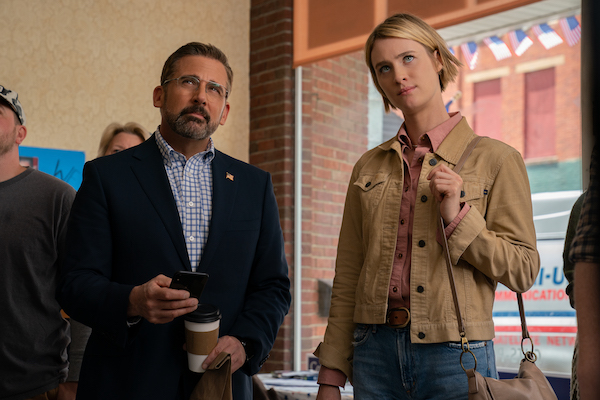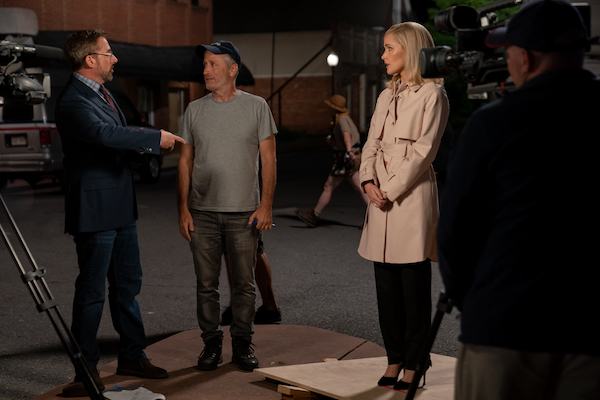Jon Stewart loves to make fun of things, and over the years he’s done a pretty good job at it. People, places, politics, they’re all fair game, and to prove he’s in on the joke, he will often make himself the butt of gags.

Stewart also thinks we’re not as smart as he is, especially about politics. That’s the driving force and fatal flaw to Irresistible, a high-reaching comedy about the election process. The latest pandemic victim, the Focus Features release starts streaming June 26.
Steve Carell stars as Gary Zimmer, a political consultant and Stewart alter ego who can’t understand how the U.S. has reached the point where a moron is president. Searching for a Democratic counterpart who will recapture the elusive “swing” vote leads Zimmer to Deerlaken, Wisconsin, where a Marine veteran has taken a stand against the Mayor’s anti-immigration policies.
Zimmer vows to make Col. Jack Hastings (Chris Cooper, playing up “sincerity”) mayor, coaching him and reassembling a team of experts to defeat Braun (Brent Sexton), the incumbent. You’d think a campaign-hardened (or -chastened) consultant might have some genuine insights to offer Hastings. Ways to convey ideas, warnings about mixed messages, hints about presentation and focus. But Zimmer sticks to the kind of easy bromides you’d find in any Hollywood film.
Stewart has some fish-out-of-water fun with Zimmer, who parachutes into small-town America with his elitist misconceptions (and tastes) intact. He mingles with locals by ordering Budweiser, is nonplused by a dial-up Internet connection, tries to stage-manage livestock at an event, and barely hides his contempt for yokels.

But Irresistible wants to have it both ways. Yes, Zimmer’s a jerk, but he’s “our” jerk because motives outweigh methods. He’s a kinder, gentler version of Michael Scott (a character Carell never played for sympathy). Stewart wants us to forgive Zimmer’s tunnel vision, his disdain for staff, his prejudice and bigotry because at least he’s not Republican. “Why do you talk to them like they’re idiots?” Hastings’ daughter Diana asks him at one point. It’s a line that tries to but doesn’t quite absolve Zimmer. Viewers could ask Stewart the same thing.
Zimmer’s campaign lets Stewart deliver broadsides against politics, chiefly the money involved but also the hypocrisy and lies inherent to advertising. Viewers may be startled to learn that politicians (and their staffs) bend the facts, or spin opponents’ statements for other purposes, or try to promote their causes by manipulating dimwitted journalists.
Or maybe not. Stewart is aiming for someone who can appreciate the sarcasm behind paleo appetizers at an Upper West Side fundraiser, who can identify both Glen Campbell and Robert La Follette, who understands that Riefenstahl reference. Someone already pretty savvy about the political process, for whom “Money Hurts Democracy” is several steps behind news.
When he was hosting The Daily Show, Stewart could rip into an ad or speech or piece of legislature, isolate its stupidity, emphasize its hypocrisy, and move on to the next bit. Here the screenplay locks him into a covering a local election from start to finish. Normally elections like this are a welter of ordinances, tax assessments, and zoning variances. Pretty much opposite of Stewart’s hit-and-run strengths.
Plus, Stewart the TV host didn’t have to tie each segment on his shows into a narrative whole. Here Stewart the screenwriter and director not only has to shape a storyline around a not-so-compelling election, find narrative suspense and momentum within fake campaigns that appear to be lacking platforms, but also flesh out the film with characters.
To Stewart’s credit, Irresistible doesn’t settle for familiar Hollywood tropes. Speechless (1994) used a similar premise as background for a sappy romance between Michael Keaton and Geena Davis. Alexander Payne set Election (1999) in high school, letting his explore the full idiocy of the process without picking sides. The recent Briarpatch TV series used an election to unravel the damaged lives of its political operatives. So why does Irresistible end up looking like generic Hollywood product?
Maybe because like David Mamet’s misbegotten State and Main (2000), there’s not a single believable character in Irresistible. There are “types,” like a colorful barfly (credited as Hofbrau Bar Fly William Smith), a hard-bitten waitress, a bunch of guys in overalls seated around a table in a mechanics’ garage, nicely dressed folks wandering around a dance in the town square, pedestrians trained not to look at the camera. None of them makes any real difference in the story.

Instead, Stewart offers celebrities, like Terminator‘s Mackenzie Davis (affable and appealing and a red herring), Spiderman‘s Topher Grace (mightily underused), Russian Doll‘s Natasha Lyonne (not one line lands), and a few cameos. Stewart leans heavily on the wonderful Rose Byrne, doing a bitter variation of her Spy villainess, but it’s a pointlessly vulgar role with few real laughs.
Stewart’s central argument seems to be that compromising personal values and beliefs corrupts the political process. But everything in Irresistible is a compromise, from the Georgia settings that pass for Wisconsin, the cusses that pass for witticisms, the extras who pass for cutesy Deerlakeners. Even the principles behind the campaigns are phony ones. Nothing is truly at stake in Irresistible, not our beliefs, not the political process, and especially not the lives of the inhabitants of Deerlaken.
And besides, what’s the point? Picking on “Heartland, USA,” as Stewart refers to it, replaying Hilary Clinton’s campaign mistakes, mocking CNN’s panels of pundits and Fox News’ outright duplicity: events have frankly overtaken this film, to a disheartening effect.


